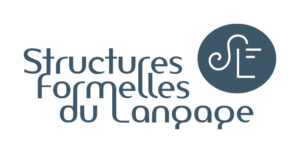A hybrid workshop on Afroasiatic morphology, Paris, 11-12 March 2022.
Venue | Program | Description | Registration | Organizers
Venue
Friday, 11 March 2022: CNRS Pouchet
CNRS Site Pouchet
Salle 255 (2ème étage)
59/61 rue Pouchet
75017 Paris
Métro 13 : stations Guy Môquet, Brochant, Porte de Clichy
Métro 14 : station Porte de Clichy
RER C : station Porte de Clichy
Hybrid option: Zoom
Saturday, 12 March 2022: Condorcet Campus
Campus Condorcet
Conference Centre building, Place du Front Populaire
Room 3.01 (3rd floor)
Métro ligne 12, station Aubervillers – Front Populaire
Hybrid option: Avaya
Program
All times CET. The 50-minute slots have 40 minutes for the talk and 10 for discussion.
Friday, 11 March (Pouchet)
| 12:00-12:15 | The organizers | Opening remarks | |
| 12:15-12:50 | Itamar Kastner | University of Edinburgh | No easy -fix |
| 12:50-13:40 | Gioia Cacchioli | Université de Genève | The Tigrinya zə- prefix: A Morphological Reflex of Successive-Cyclic Movement |
| Break | |||
| 14:10-15:00 | Noam Faust | Université de Paris 8 and CNRS | nifʕal: a defective story |
| 15:00-15:50 | Iris Kamil | University of Vienna | t-Forms of the Akkadian Stative |
| Break | |||
| 16:20-17:10 | Ruth Kramer | Georgetown University | The Morphosyntax of Imperative Agreement in Ethiosemitic |
| 17:10-18:00 | Daniel Harbour | QMUL | Dispatches from Babel: What the Old Testament teaches of scaffolding |
Saturday, 12 March (Condorcet)
| 12:00-12:50 | Alexander Martin | Laboratoire de Linguistique Formelle, Université de Paris, CNRS | Revisiting the prefix/suffix asymmetry: Experimental evidence from Kîîtharaka |
| 12:50-13:40 | Sabrina Bendjaballah | CNRS | The role of templates in the morphology of Taqbaylit Berber stative verbs |
| Break | |||
| 14:10-15:00 | Mohamed Lahrouchi and Noam Faust | Université de Paris 8 and CNRS | The locus of gender in Tashlhiyt Berber nouns |
| 15:00-15:50 | Matthew Hewett | University of Chicago | Distributing Semitic verbal affixes across modules |
| Break | |||
| 16:20-17:10 | Jean Lowenstamm | CNRS | Confronting the golem |
| 17:10-18:00 | Andrew Nevins and Ur Shlonsky | UFRJ/UCL & Université de Genève | Rescaffolding the bundle: Notes towards a syntactic account of Afroasiatic inflection |
| 18:00-18:30 | Laura Kalin (chair) | Princeton University | General discussion |
Workshop description
It is common to divide verbal forms in Semitic and much of Afroasiatic into two paradigms, depending on whether agreement affixes are prefixes or suffixes. In one paradigm, the exponents of person, number and gender are suffixal while the other paradigm has both prefixes and suffixes. For example, Hebrew past tense is typically suffixal (e.g. axal-tem ‘you.PL ate’) while non-past is prefixal as well as suffixal (to-xl-u ‘you.PL will eat’). Crucially, no language in this family has a purely prefixal verbal paradigm.
Halle (1997) assumed that the position of the affixes is an idiosyncratic property of a given item, encoded in its Vocabulary entry. Much of the subsequent research in this domain has found this assumption unsatisfactory; in many cases, for example, the distinction is based on the tense (or aspect) of the verb. Yet this generalization does not apply across all forms, much less all languages. Recent work has attempted to explain or derive the properties and the position(s) of phi features in the Semitic verb from the interplay of morphological, syntactic and phonological rules or constraints, including verb movement or linearizaton-related constraints.
This mini-workshop focuses on the prefix-suffix issue in Afroasiatic and hopes to engage a discussion among researchers concerned with different facets of this issue.
Registration
To join the online component, please fill out this registration form: https://forms.gle/1ss5Jso4m11oEMC8A
Organizers
Mohamed Lahrouchi (CNRS, local contact)
Andrew Nevins (UFRJ/UCL)
Ur Shlonsky (Geneva)
Itamar Kastner (Edinburgh)